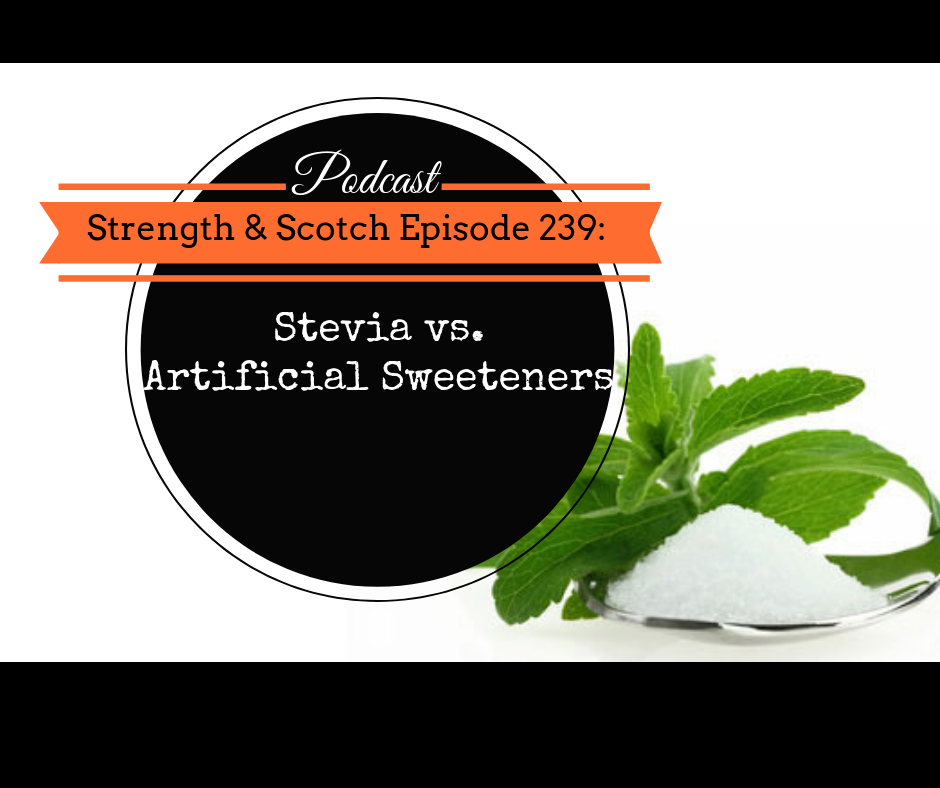Episode 239 Show Notes
Grant and Heavey tackle a listener’s question about Stevia, a plant-based natural sweetener. Is it a better alternative to other artificial sweeteners? What about Xylitol? All this and more on today’s sweet topic on sweeteners.
[03:10] Question on Artificial Sweeteners
A listener is asking about Stevia. He has always avoided artificial sweeteners based on other people’s negative reactions and how it can worsen sweet cravings. He was wondering whether Stevia was a better alternative since it is plant-based. But, the listener has also come across readings that stevia alters gut flora as artificial sweeteners do.
He also uses Xylitol mouthwash being good for oral health. But he has also used Xylitol in his coffee in the past so he was wondering about it.
Another listener, Steve, is asking the same question about Stevia and whether it’s a much better alternative to unnatural sweeteners.
[05:45] Classifying Different Sweeteners
There are high-calorie sweeteners like table sugar, high fructose corn syrup, honey, and maple syrup.
Today’s episode will be on low-calorie sweeteners which are broken down into a few types. One of them is the artificial sweeteners. Six have been approved for use in the U.S. by the FDA – aspartame (Equal and Nutrisweet), sucralose (Splenda), neotame, ace-K, saccharin (Sweet’N Low), and Advantame.
Another type would be the natural sweeteners, divided into different sub-groups. One of them is Stevia, which is an extract from a plant. Hence, it’s a natural sweetener.
The other subgroup includes sugar alcohols. They’re pretty natural as they occur in fruits and vegetables. But when they’re put into our food, the commercial process to extract the sugar alcohols comes from other carbohydrate sources. Examples would be Xylitol, Sorbitol, and Erythritol.
The highest calorie options out of all these low-cal sweeteners are 50% to 80% absorbable, digestible as compared to the other ones which are much lower.
[09:45] Are Sugars Absorbed by the Body?
Artificial sweeteners are not absorbed by the body. They just pass through us. We don’t tend to be affected as much by them because we’re not really absorbing them. Sugar alcohols are like fibers where our bodies are not able to absorb them.
Heavey points out the popular belief that artificial sweeteners are harmful. There are people who would avoid these at all cost but they still make questionable dietary choices. He believes that the cause for concern was largely overstated.
[12:40] Do Artificial Sweeteners Cause Cancer?
People tend to get their panties in a bunch with regard to two topics when it comes to artificial sweeteners. First is cancer. Some of these products are associated with increased cancer incidence in rodents.
A 2005 study linked increased cancer rates to very high doses of Aspartame in rodents. But they’re talking about extremely high doses here, equivalent to drinking 2,000 cans of diet soda in a day per person. And the FDA has set daily intake limits on these products which are far lower than that.
Moreover, the metabolic pathway for humans and rats is similar in some ways, but not in the way that Aspartame is processed. This made the research less applicable.
We’ve been drinking aspartame for a very long, long time across millions of people and hundreds of countries. Just because we’ve been taking them a long time doesn’t mean that’s okay.
A 2006 study from the National Cancer Institute looked at cancer rates in older adults. They tried to correlate aspartame exposure to increased cancer incidence but they were not able to make any connection.
[15:10] Diet Soda = Weight Gain?
Another area that people get worked up about artificial sweeteners is with regard to weight gain. There’s observational research showing that people who drink more diet soda or consume more aspartame are heavier. But that’s because people who are heavier are trying to lose weight so they’re looking for lower calorie substances.
Heavey has come across two different groups – one was taking sucrose and the other taking an artificial sweetener. Every single time he sees a study, there’s no increased incidence of weight gain from the artificial sweetener. Usually, the people on the sucrose gain weight while those on the artificial sweeteners do not. Hence, weight gain is not an issue with regard to artificial sweeteners.
[17:00] Blood Sugar and Insulin Levels
There’s a lot of misinformation on the topic of blood sugar and insulin levels. Listen to a previous episode on carbohydrate consumption and the insulin hypothesis. Start with an understanding of this before even worrying about whether artificial sweeteners are leading to increased insulin response.
[17:44] Obesity
A relatively recent study mentioned back in Episode 106, looked at the effect of artificial sweeteners on the gut microbiome in a way that ended up affecting glucose response in the rodents.
These rodent studies were followed up with very short, small human trials. They were able to alter the human glucose response adversely over a period of 7 days from consuming artificial sweeteners.
Heavey stresses that this is a very small study. It’s interesting but we still need to conduct more robust follow-on studies on this.
So even though we’re not absorbing them, they’re going through our digestive tract and fermenting inside there. As part of that, they can have the possibility to affect our gut microbiome.
[21:44] What Are Sugar Alcohols?
Sugar alcohols are low-calorie sugar substitutes. They’re not as sweet as sugar compared to artificial sweeteners which are sweeter than sugar. Xylitol is the most popular sugar alcohol and the most researched although sorbitol and erythritol are also common.
These carbohydrates are difficult to digest. They’re in the same category as fiber and resistant starch. They naturally occur in many fruits and vegetables. But if you have issues with FODMAPs, you’re going to have issues with these kinds of food since they make up the P (Polyols) in FODMAP.
They’re not calorie-free. Their absorption rate varies from 50% to 80% depending on the compound. There are fewer studies on sugar alcohols demonstrating safety than artificial sweeteners. There are some long-term human studies that have measured no adverse effect.
{23:12] Benefits of Sugar Alcohols
There are certain benefits to sugar alcohols. They’re used to reduce body weight. They reduce blood glucose and serum lipid levels in diabetic rats. Their most well-known benefit is on dental health. They help prevent tooth decay, even probably more effective than fluoride in preventing cavities. Hence, they’re widely found in mouthwash and chewing gum.
The only downside of this product is digestive distress. It can lead to gas bloating and diarrhea. If consumed regularly, people may adapt to this and the symptoms can go away.
Heavey suspects that because of their chemical nature, they seem to act more as a probiotic type of substance so it’s possible they could help promote good gut bacteria. That being said, there’s no reason to be concerned about the sugar alcohols.
[26:46] Sugar Alcohols in Protein Bars and Artificial Sweeteners in Sodas
Companies are adding sugar alcohols to protein bars as people demand higher protein but lower-calorie and better-tasting stuff. So they add these sugar alcohols to make it an appealing product.
Just an interesting thing that Grant also noticed is that the artificial sweeteners are seen more in liquid products but the sugar alcohols are more in food products.
Moreover, the aspartame flavor in diet coke doesn’t taste sweet in the traditional sense. But Coke Zero came out with lower calories and tastes just like the classic Coke. Heavey looked this up and found that Coke Zero is sweetened with aspartame and ace-K.
[30:08] Stevia and Its Effects
Stevia is known as the natural sweetener, extracted directly from a plant that is 250x sweeter than sugar. This has been consumed for years in South America.
Stevia has been associated with anti-inflammatory and anti-oxidative effects. It may help productivity in the kidney, pancreas, liver, and brain. But we still need more studies on this.
The body absorbs Stevia, but we just don’t need very much of it. Nevertheless, it has a higher potential for affecting our bodies.
However, higher doses have been linked to fertility problems in animals. This isn’t cut and dry. There’s a lack of evidence of this in humans. Some of the follow-up research studies have even called the original research into question. Hence, this might not be something people should be concerned about. But if you’re trying to get pregnant, then there could be a small risk to it.
There’s been no significant effect on appetite. While a couple of studies showed a decrease in high blood pressure in hypertensive patients with prolonged use. So this might be helpful for those with hypertension in terms of lowering blood pressure.
All those being said, Stevia can be considered a safe substance.
[33:23] What Should You Consume?
There was a time that Heavey didn’t like the taste of water. So much that he was consuming Coke everyday. This altered his palate that made him prefer sweet foods. This sets you up for failure in your diet. One of the ways to curtail this is to drink water when you feel like drinking a soda.
Heavey’s point is that there’s a lot of value in getting yourself away from sweets. Sure, you can hack it with these low-cal sweeteners. But why not try to favor less sweet foods in your diet. Go for more water. Eat vegetables. Just have a variety. When you’re craving for sweets, have some fruits which are far less sweet than sweetened foods.
Companies have really gone a long way in developing hyper-palatable foods and we’re being trained to eat these kinds of food. Either you lean into that or fight against it.
At the end of the day, don’t consume massive quantities of these sweeteners. Just because we didn’t find anything wrong with them doesn’t mean there’s nothing wrong with them at all. We might find something in 20 years. Unless you’re drinking tons of those things, these sweeteners are all generally okay.
Soda is packed with calories so be careful with drinking a couple of cans in a day. But a packet of sugar doesn’t have that many calories in it.
Finally, just because something is natural doesn’t mean it’s healthier or better. Therefore, understand what’s in every stuff you consume. Research about it. And don’t go overboard.
[38:35] Penderyn Whisky
Grant and his wife, Elizabeth attended a Penderyn tasting event run by Southern California Whiskey Club. Follow them on Instagram @southerncaliforniawhiskeyclub. They had eight different tastings which they found interesting. First, the master distiller and the assistant distiller are both women. They’re the only ones doing it in Wales.
It’s a young whiskey, none of them had age statements. They’re all about 3-8 years on average. They use a different distillation process that combines continuous still with pot still. But it makes an incredible spirit as Grant would describe it. Absolutely delicious!
They’re aged in smaller barrels to age quicker. At the end of the tasting, they get ex-peated casks from Laphroaig and fill that with their spirit and absorb some of that Laphroaig with a gentle hint of it. It’s called the Penderyn Celt. Grant recommends this if you want a hint of peat.
Links
Strength and Scotch Podcast Episode 212: Carbs and Obesity
SS 106: Artificial Sweeteners… Are They Really Safe?
Southern California Whiskey Club. Follow them on Instagram @southerncaliforniawhiskeyclub.

Check out the gear page for everything Strength & Scotch! You’ll find a listing of all the supplements and other programs we’ve discussed on the show as well as our killer t-shirts!

